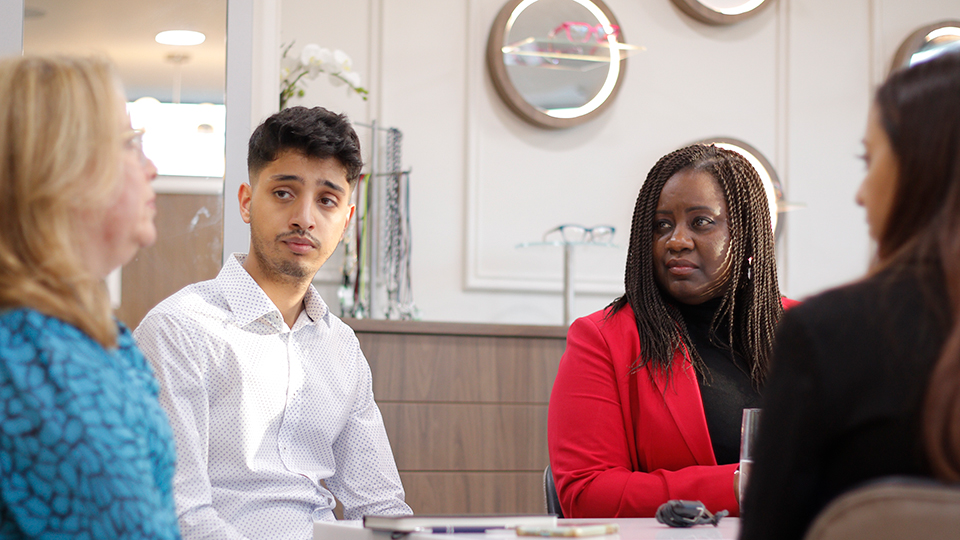- OT
- Professional support
- Health services
- AOP hosts optometrist roundtable with MP Marsha de Cordova
AOP hosts optometrist roundtable with MP Marsha de Cordova
More effective referrals and the need for myopia management funding were up for discussion when MP Marsha de Cordova met eye care practitioners in her constituency

31 January 2024
Optometrists took part in a roundtable discussion with MP Marsha de Cordova in her Battersea constituency on Friday 26 January.
The event, organised and facilitated by the AOP, took place at Karen Lockyer Optometrists in Clapham Junction.
Attendees included practice owner and optometrist Karen Lockyer, the AOP’s clinical and professional director, Dr Peter Hampson, Moorfields Eye Hospital optometrist, Indy Ghuman, general manager at Specsavers Clapham Junction, Graham Tritton, and optometrist Henna Ali, who is vice chair of Merton, Sutton and Wandsworth Local Optical Committee (LOC).
Through taking part in the practice visit, de Cordova aimed to learn more about the challenges eye care practitioners are facing in her constituency.
Opening the roundtable discussion, she emphasised that promoting eye health has been a key aim since she joined Parliament seven years ago.
“I’m really keen to continue to collaborate on this issue,” she said. “Due to my own lived experience of having been born with nystagmus, I only know what it is like to be short-sighted. That’s why I’m an absolute champion [for eye health].”
She added: “It really has been my mission to improve eye health care and support for anybody living with sight loss.”

The ensuing discussion covered areas including challenges to service delivery, such as inefficiencies and lack of consistency in referrals into secondary care optometry.
Ghuman highlighted that digital connectivity, which is one of the AOP’s key policy asks, could lead to more collaborative care throughout England.
Ali pointed out that her LOC area benefits from a single point of access when it comes to referrals, but that neighbouring LOC areas do not all have electronic referral systems in place.
Karen Lockyer said that her practice is well-equipped and in a strong position to potentially take on work from secondary care, but that funding must be in place for this to happen.
The NHS waiting list for specialist eye care currently stands above 600,000. The Labour Party announced in a speech on 23 January that it plans to harness High Street optometry in order to assist with this backlog if it is elected at the next general election.
Lockyer also emphasised that myopia management should be NHS-funded. She measures the axial length in all her child patients, she said.
“We are looking at children, to try and prevent this myopia epidemic,” Lockyer said. “In children, we can control or slow down myopia progression. If you don’t slow it down, when they get older you have this whole catastrophe approaching: people with retinal detachments, macular degeneration, glaucoma.”
She added: “Interventions are expensive at the moment. Why should it be that only people who can afford it have the interventions?”
Tritton shared the story of a mother who attended his practice with a five-year-old child who was quickly identified as a high myope.
“We spoke about myopia management and she [the mother] genuinely couldn’t afford it, which broke her heart,” Tritton shared.
He explained that the child’s grandparents stepped in to help and the practice was able to provide the service at a reduced rate.
When asked about her level of optimism on progress being made when it comes to eye care policy, de Cordova believes that “a start” has been made, but progress relies on practitioners “banging the drum” in their local areas.
It is “striking” how little attention has been paid to eye care “and the amazing opportunities that there are, including joining up primary and secondary care, and the benefits that it will bring,” de Cordova said.
She added: “Nobody is really tapping into that, and if it is being done, it’s not being done in a consistent way. Even in London, South East London does something very different to South West London.
“The mind boggles in that respect, but that is exactly what's happened, just because of the way that funding is being delivered. We do need to look at this in a more consistent way.”
Read more from the AOP’s roundtable with Marsha de Cordova in OT’s April/May edition, landing 8 April.
The AOP is also encouraging members to contact their MP as part of its Sight won’t wait campaign. Read more here.
The AOP is ready to support practitioners who would like to host an MP visit at their practice. If you are interested in potentially hosting an MP, get in touch.
Lead image, l-r: Henna Ali, Graham Tritton, Karen Lockyer, Marsha de Cordova MP, Indy Ghuman, and Dr Peter Hampson
Advertisement


Comments (0)
You must be logged in to join the discussion. Log in